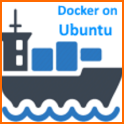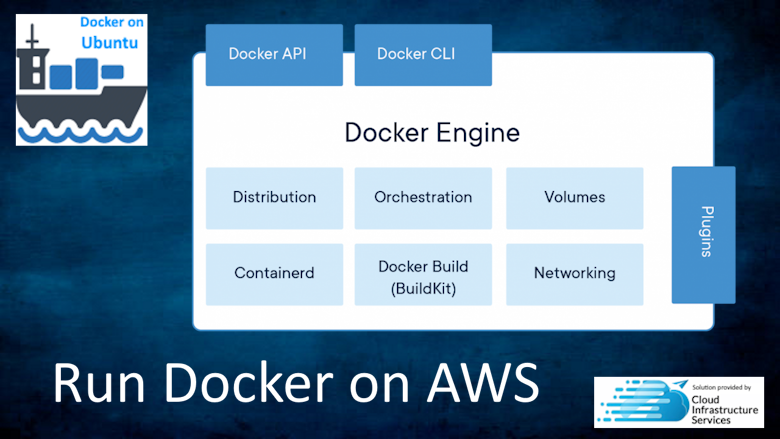
Overview

Docker
Docker on Ubuntu 22.04
This is a repackaged open source software product wherein additional charges apply for support & maintenance.
Docker is a powerful platform that enables developers to build, deploy, and manage containerized applications with ease. Running Docker on Ubuntu, a stable and popular Linux distribution, provides a reliable environment for developers to deploy, scale, and maintain applications seamlessly on AWS.
The Docker CLI uses the Docker REST API to control or interact with the Docker daemon through scripting or direct CLI commands. Many other Docker applications use the underlying API and CLI.
The Docker daemon (dockerd) listens for Docker API requests and manages Docker objects such as images, containers, networks, and volumes. A daemon can also communicate with other daemons to manage Docker services.
Dockers portability and lightweight nature also make it easy to dynamically manage workloads, scaling up or tearing down applications and services as business needs dictate, in near real time - perfect for AWS's elastic infrastructure.
Docker Features
- Lightweight Containers: Docker containers isolate applications with minimal resource usage, ensuring efficiency and speed on AWS EC2 instances.
- Consistent Environment: Allows consistent environments across development, testing, and production, reducing compatibility issues across AWS regions and availability zones.
- Efficient Resource Utilization: Unlike traditional virtual machines, Docker containers share the OS kernel, making them lightweight and fast - ideal for AWS cost optimization.
- Simple Versioning and Rollback: Docker supports versioning for containers, making it easy to roll back to previous versions if needed.
- Easy Scalability: Docker Swarm and Kubernetes integration enables easy scaling of applications to handle increased traffic or workload, integrating seamlessly with AWS Auto Scaling and EKS.
- Broad Community and Library Support: Access a wide range of pre-configured Docker images on Docker Hub and AWS ECR, reducing setup time.
- Continuous Integration and Continuous Deployment (CI/CD) Compatibility: Supports CI/CD pipelines for automated testing and deployment, integrating with AWS CodePipeline, CodeBuild, and CodeDeploy.
- Security and Isolation: Docker containers provide a secure, isolated environment, reducing risks associated with multi-tenant applications on AWS.
- Multi-Platform Support: Run containers across various platforms, including AWS cloud, desktop, and server environments.
- AWS Integration: Docker daemon (dockerd) manages Docker objects such as images, containers, networks, and volumes with seamless AWS service integration
- AWS ECR Integration: Docker registry to store Docker images in Amazon Elastic Container Registry
- REST API: Specifications that allow programs to communicate with the daemon and instruct operations
- Command Line Interface (CLI): Client (the docker command) for easy container management
- Namespaces: Provide a layer of isolation for secure multi-tenancy
- Control Groups: Limit applications to a set of AWS EC2 resources
- Union File Systems (UnionFS): Efficient storage management
- Container Format (libcontainer): Standardized container runtime
- Access to Docker Hub and AWS ECR: Public and private image repositories
Docker on Ubuntu offers a practical alternative to traditional virtual machine deployments on AWS, competing with other container solutions like Podman, LXC/LXD, and rkt while leveraging AWS's robust infrastructure.
Disclaimer: Docker is a registered trademark of Docker Inc and is licensed under Apache License V2. No warranty of any kind, express or implied, is included with this software. Use at your risk, responsibility for damages (if any) to anyone resulting from the use of this software rest entirely with the user. The author is not responsible for any damage that its use could cause.
Highlights
- The Docker CLI uses the Docker REST API to control or interact with the Docker daemon through scripting or direct CLI commands. Many other Docker applications use the underlying API and CLI.
- Dockers portability and lightweight nature also make it easy to dynamically manage workloads, scaling up or tearing down applications and services as business needs dictate, in near real time.
- The Docker daemon (dockerd) listens for Docker API requests and manages Docker objects such as images, containers, networks, and volumes. A daemon can also communicate with other daemons to manage Docker services.
Details
Introducing multi-product solutions
You can now purchase comprehensive solutions tailored to use cases and industries.

Features and programs
Financing for AWS Marketplace purchases

Pricing
- ...
Dimension | Cost/hour |
|---|---|
t2.medium Recommended | $0.03 |
t3.micro | $0.03 |
t2.micro | $0.03 |
t2.large | $0.03 |
r5n.16xlarge | $0.03 |
r4.4xlarge | $0.03 |
m3.xlarge | $0.03 |
r5ad.xlarge | $0.03 |
f1.16xlarge | $0.03 |
m5dn.metal | $0.03 |
Vendor refund policy
We do not currently support refunds, but you can cancel at any time.
How can we make this page better?

Legal
Vendor terms and conditions
Content disclaimer
Delivery details
64-bit (x86) Amazon Machine Image (AMI)
Amazon Machine Image (AMI)
An AMI is a virtual image that provides the information required to launch an instance. Amazon EC2 (Elastic Compute Cloud) instances are virtual servers on which you can run your applications and workloads, offering varying combinations of CPU, memory, storage, and networking resources. You can launch as many instances from as many different AMIs as you need.
Version release notes
Latest OS updates available, simply run 'sudo apt-get update' to install latest OS package updates.
Additional details
Usage instructions
Scroll down to 'Getting Started' on the following URL: https://cloudinfrastructureservices.co.uk/how-to-setup-docker-engine-containers-on-linux-in-azure-aws-gcp/
Resources
Vendor resources
Support
Vendor support
Email support, contact us through our website or leave a comment on our getting started guide
AWS infrastructure support
AWS Support is a one-on-one, fast-response support channel that is staffed 24x7x365 with experienced and technical support engineers. The service helps customers of all sizes and technical abilities to successfully utilize the products and features provided by Amazon Web Services.
Similar products



